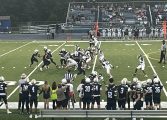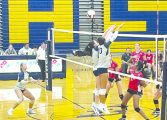By Page H. Gifford
Correspondent
Lake Monticello Karate Academy will be sending 15 athletes to both the National Championship and World Championships this summer. Robert Silverman, their head instructor and owner of Lake Monticello Karate Academy, will also be in attendance.
Silverman will also be a USA coach for Worlds. One member of the team, Renae Chiovaro, talks about her experience and journey heading into the competition.
Chiovaro has been studying karate for eight and a half years and started when her boys were five and seven years of age.
“My boys wanted to start karate and my personal trainer at the time told me that I needed to find an activity to increase my fluidity. I’m a dental hygienist and sit in awkward positions most of the day which resulted in back issues. I decided to give karate a try when my boys started,” she said. “I quickly fell in love with the core values and what karate was teaching my boys – discipline, focus, respect, and confidence. Plus I loved the physical challenge. I developed core strength and no longer have any back issues.”
She says she has been at the dojo 5 days a week since discovering her love and passion for karate. A dojo is a Japanese term, which means “place of the way.” Throughout Japanese history, dojos were formal meeting places for students of any of the Japanese martial arts. Nowadays, dojos are primarily associated in the West with a variety of Asian martial arts, such as karate, judo, and samurai. It’s clear that Chiovaro embraces the culture and learns the spiritual pathways that give confidence and strength to what she does and to know oneself in every facet. This is a given in Asian cultures, whether it is yoga or karate, which have many mental and physical benefits.
“Karate is challenging and there is always something to learn. It’s not only physically challenging but also mentally. Earning a black belt is just the start of a martial arts journey. At the beginning of training, you learn the basics of how to move your body. As you progress, you learn the application of those movements you have learned and your movement becomes more instinctual,” she said. “Karate has helped me become stronger mentally and physically. It has taught me perseverance and overcoming challenges I didn’t think were possible. It has helped me become a more confident person.” She owes her success to her head instructor and mentor, Robert Silverman. “He has pushed me out of my comfort zone and I’m a better person for it.”
She added that he comes up with a teaching strategy that will work for each individual.
“He has helped me grow into my role as an instructor and I model his teaching style.” She said she enjoys teaching and coaching both kids and adults. “I like watching the students’ confidence grow. It’s rewarding to see a timid child turn into a confident and strong individual. I also feel that self-defense is extremely important for young people to learn, especially our girls.” She explains the philosophy of teaching children how to use their voice as the first line of defense and to continuously be aware of their surroundings.
A key component of karate is the colored belts which show a level of experience. Chiovaro is a Nidan (2nd degree black belt) in Shotokan karate. She explains that every karate school has its belt color system.
“Each belt level or kyu (class) rank is reached by achieving a certain level of techniques, kata (form), and self-defense moves. In our dojo, we have no set belt testing time. Meaning just because a person has been there for a several months does not mean they will test for the next rank. Each person achieves and earns their rank and next belt when they have met their requirements. It takes five to six years to achieve a black belt,” she said.
This year the team learned that the World Union of Karate-Do Federations (WUKF) Karate World Championships were being held in Fort Lauderdale. This is a once-in-a-lifetime opportunity for Chiovaro and others to compete against international athletes so close to home. She retired from competing three years ago to focus on coaching. Before that, she and her boys had competed for five years all over the United States.
Nine months ago she decided to get back into competing in hopes of making the USA team for Amateur Athletic Union (AAU). In April, the team attended AAU Team Trials in Chicago, and all 15 athletes qualified for the team.
“It’s been a challenge for me to find time to train between my regular full-time job, teaching karate, and caring for my family. Thankfully my husband is extremely supportive and takes on some of the household duties so I can train.” She adds that the team has a unique opportunity this year to participate in AAU Nationals and then a few days later WUKF Worlds. “It’s going to be a challenge but our team has worked hard and we are ready.”




